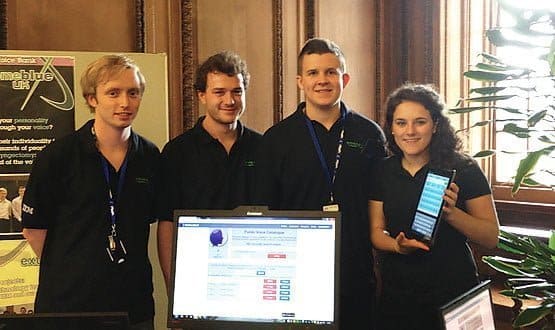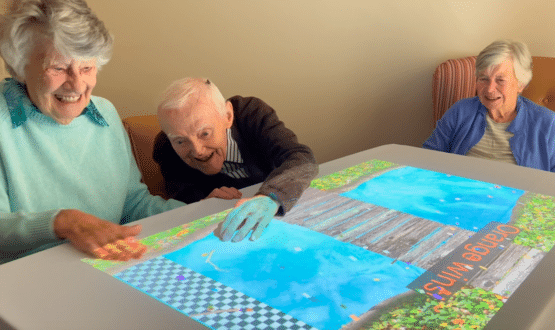Blue Wednesday
- 7 October 2013

On a sunny September day, IBM’s UK headquarters is buzzing with university students in blue t-shirts, excited to be showing off the projects they have been working on over the summer.
The Extreme Blue European Expo is an annual event at which the company’s interns demonstrate their projects. This year, several of those projects are healthcare apps, aimed at issues that range from dementia to laryngectomies.
The apps are produced entirely by the students, albeit with the guidance of IBM mentors, over the 12 week programme, which ends with a competitive event at which a winning group is crowned.
The Voice
At IBM’s stately-home HQ in Hampshire, the winning team is unveiled as team voice bank. Its students have worked with a pharmaceutical company to create a website that allows users to store their voice.
This is coupled with an Android app that helps them to communicate after a laryngectomy; which leaves patients unable to speak without a prosthesis or electrolarynx.
The website records 1,500 phonetically balanced sentences. The app uses predictive text and, by pressing a button, people can communicate through the app with their “own” voice.
Jessica Evans, a business management student from Durham University, shows off the app on a tablet device and says it will remember a person’s daily routine.
“Based on your GPS location, and the time of day, it comes up with different sentences. If you go into the same coffee shop around the same time every day, it will recognise that and suggest sentences you have used there in the past.”
The team is clearly very proud of both the app and of winning. Evans says they were very touched by meeting both surgeons and patients while doing research. “It made us really want to help people,” she says.
Sharing is caring
While they are on the very competitive programme, interns are able to take advantage of IBM’s wide range of technologies and expertise. It’s a full-on 12 weeks; the company’s mentors are expected to spend free time with the students.
Conor Delahunty, a final year computer engineering student at Trinity College Dublin, tells EHI that he’s looking forward to some sleep.
“I wasn’t sure how it was going to go, but I really enjoyed [the programme],” he adds, while standing next to several empty cups of coffee.
His group of four computer and business students from Ireland created an app called ‘care connect’, with the aim of using mobile technology to help care teams to collaborate to improve patient care.
Delahunty says the app, which is a proof of concept at the moment, lets different people – such as a social worker, a community nurse and a doctor – communicate with each other. It also sends alerts when someone updates a patient’s details.
“We want to enhance collaboration of a team to improve patient care. It’s not just healthcare, it’s a holistic view with everyone involved in the patient’s wellbeing,” he says.
“I can see all the information I need for the patient. We also got a conversation screen where we can send information about the patient to the others in the healthcare team.”
The app also enables healthcare team members to take and share pictures that demonstrate a patient’s progress or that might need a second opinion.
The Irish team’s project uses IBM Curam software, which is a suite of social programme management software that can be used by relatively specialised teams, such as those working in child welfare or on compensation claims.
As a result, Delahunty hopes the app will be developed further. “Curam have talked to us and want to make an entire mobile app, so we would hope this would link in and be a part of that,” he says.
Pressed on the kind of issues that tend to bedevil projects of this kind out in the ‘real world’, however, he admits that the interns simply parked many issues. For example, they did not worry about information governance.
“With this project we didn’t worry about patient confidentiality because it’s just a proof of concept. In terms of sharing across the team, once the patient would agree to share the information, we hope they would be ok with it,” he says.
Still, the team clearly grasped the key point. “The issue of security is a minefield.”
Open source potential
The projects are usually chosen because one of the mentors has a special interest in a certain field. Kevin Safford has spent his free time mentoring a group of students creating a system for people with dementia, their carers and family members.
“I came up with a personal solution; an app to provide care to my mum,” he says. “It couldn’t be more commercially adopted, but these students have taken what I have done and make it easier for the average person to adopt.”
The system starts by giving a patient an Android tablet. A carer can log-in to the system online and configure the device through a web interface. For example, they can set up an automatic trigger to turn on the TV when their favourite series is on.
The carer can also write a letter to the patient setting out important events to remember throughout the day, and use the device to create photo slideshows and video calls.
Jim Patterson, a business studies student at Lancaster University, says that after visiting care homes and speaking with sufferers of dementia and their family members, he got very excited about making the system work.
“Dementia is quite removed from our everyday lives and not really something I thought of before. We really wanted to make something that would be useful for both the patient and the family,” he says.
The team got so involved that it even did a ‘mud run’ to raise money for Dementia UK. Safford is very proud of the students he has mentored and of the system they have developed.
“It’s been a blast. It’s the first time I’ve ever got involved in it and I’ve really loved it,” he says. “The challenge now is to get it adopted by the open source community.”




